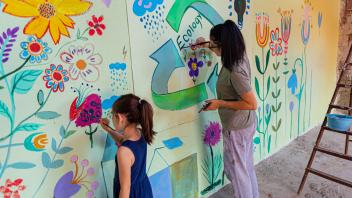Reading adventure packs can be fun to develop and to assemble. Teachers can design bags to complement class curriculum, extend specific areas of study, or promote a better understanding of issues related to a child’s world.
Elements of a great reading adventure pack
- An engaging theme — one that will spark thinking, creativity, and observation skills
- Three or four theme-based books (fiction and nonfiction), selected at an appropriate reading level
- Related interactive activities, for example: puzzles, sorting/matching cards, dramatic play props, art supplies
- Letter to parents explaining the purpose of the literacy bags and a brief list of reading tips
- Parent response form (optional)
- Checklist of the contents to make returns to school easy
- Colorful, inexpensive backpack to store and transport everything. One with a clear plastic sleeve is perfect for slipping in a labeled drawing or photograph that illustrates the theme.
It starts with an idea
There are as many reading adventure pack themes as there are stars in the sky. Why, there’s an idea for a theme! A Starry, Starry Night pack might include these elements:
- The Kids Book of the Night Sky by Ann Love (Turtleback Books)
- The Zoo in the Night Sky by Jacqueline Mitton (National Geographic Children’s Books)
- Once Upon a Starry Night by Jacqueline Mitton (National Geographic Children’s Books)
- How the Stars Fell into the Sky: A Navajo Legend by Jerrie Oughton and Lisa Desimi (Sandpiper Houghton Mifflin)
- Make your own star chart pattern
- Constellation flash cards
- Self-stick glow-in-the-dark stars (for kids to create their own bedroom constellations)
- Connect-the-dots constellation templates
- A journal for families to write in about the theme — each student can write a few sentences and draw a picture, too
Everyone benefits
The reading adventure packs engage teachers, parents, and kids. This innovative school-to-family project can:
- Strengthen the family-school partnership
- Help parents to become more aware of the class curriculum
- Allow all parents — regardless of culture, circumstance, education level, or English language proficiency — to feel that they are involved directly in their child’s learning
- Provide parents with a structure and model for reading with their kids
- Establish a regular family reading routine
- Make reading fun and interactive, igniting an enthusiasm for literacy
- Build an awareness of the breadth of books available for children
- Show parents how to connect what you read in books to what is happening in the world around
- Stimulate conversations around reading
- Encourage home-to-school communication
Citation
Reading Rockets © 2007
Reprints
You are welcome to print copies or republish materials for non-commercial use as long as credit is given to Reading Rockets and the author(s). For commercial use, please contact [email protected].
